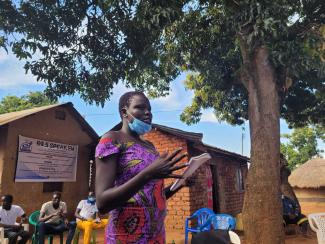Media
Promoting pluralistic discourse

South Sudan has been haunted by civil strife since 2016. Whenever violence re-erupts, people flee across the border to Uganda. This neighbouring country is indeed quite welcoming, and now hosts some 1.5 million refugees. The border is open, and people from South Sudan can choose to reside in Uganda wherever they want. However, Uganda’s resources are limited, and Ugandans are becoming less tolerant. The coronavirus pandemic has made both poverty and inequality worse (see Ronald Ssegujja Ssekandi on www.dandc.eu).
In this difficult scenario, local media can play a helpful role by facilitating dialogue between different communities. Journalists can ensure that Ugandan society hears the voices of refugees. All too often, they fail to do so. Language barriers matter, and there are issues of access to the media. International support for local media outlets can make the difference. Media development organisations like DW Akademie provide support, in terms of funding as well as skills training.
The goal is to enable local partners to provide better reporting and involve more voices from more diverse backgrounds. Strengthening the freedom of expression this way results in more pluralism and, more generally speaking, a stronger civil society.
Community dialogue
Consider the example of the community dialogue in Gulu, a small town in northern Uganda, where refugee families from South Sudan have been living for about five years. Most of them belong to the Dinka people. For the dialogue, refugees met with Ugandans, including officials from government agencies, local policymakers and representatives of relief organisations. The event took place between mud houses, with people from South Sudan sharing their experiences. The problems the refugees mentioned include the lack of valid documents and the scarcity of jobs. Young men face discrimination: Some Ugandans consider South Sudanese males as “aggressive” simply because they are from a country with a reputation for violence, due to the civil war.
The policymakers and officials listened carefully. They rarely have an opportunity to talk with refugees, even though their decisions have an impact on the refugees’ fate. The people concerned have even fewer opportunities to tell others how they see things.
The community dialogue in Gulu was organised by Speak FM, a local radio station. The event was recorded and broadcast later. A prominent radio host chaired the meeting, encouraging everyone involved to speak their minds freely.
Jane Angom, Speak FM’s editor-in-chief, spells out the event’s message: “You belong here. Your views matter to us. Refugees too are entitled to the freedom of expression.”
The event in Gulu was one of a series of similar meetings that involved members of the refugee community and the host society. They were held in nine Ugandan locations and seven South Sudanese locations in October and November 2021. All were hosted by local radio stations with support by the German media development agency DW Akademie (see box).
Fighting stereotypes in Pakistan
Other projects run by DW Akademie are designed to change the partner country’s debating culture in ways that boost free speech and a free press. In Pakistan, for example, efforts are being made to fight hate speech which targets minorities. The goal is to include marginalised groups in society better.
Pakistani media have a pattern of reinforcing stereotypes. About 7.5 million people belong to non-Muslim religious minorities. They are largely ignored in political discourse. On social media, however, defamation is increasingly common.
How the media cover women tends to be rather one-dimensional too. “Women are portrayed as sexual objects and victims of abuse,” says Amber Rahim Shamsi, a prominent and popular news anchor, and points out that the implication is that the media are guilty of both. It also bothers her that advertising uses dominant and impressive images of men, but submissive images of women.
Less discrimination
With an eye to promoting more diverse and less discriminating media coverage, DW Akademie has organised skills trainings as well as a networking conference in Pakistan. The focus was on four marginalised groups: women, faith communities, trans persons and the disabled. The positive impact is evident, as many of the participating journalists have tackled diversity topics. Many, moreover, relied on trainers’ sustained support when doing so.
Discussing gender identity and the concerns of trans people is not difficult in Pakistan (see box of Marva Khan on www.dandc.eu). By contrast, any mention of sexual orientation remains quite risky. In order to achieve structural changes regarding diversity-sensitive reporting, further projects are needed to raise awareness at the level of local media.
Sheila Mysorekar is a freelance journalist and a senior consultant for DW Akademie.
sheila.mysorekar@dw.com










